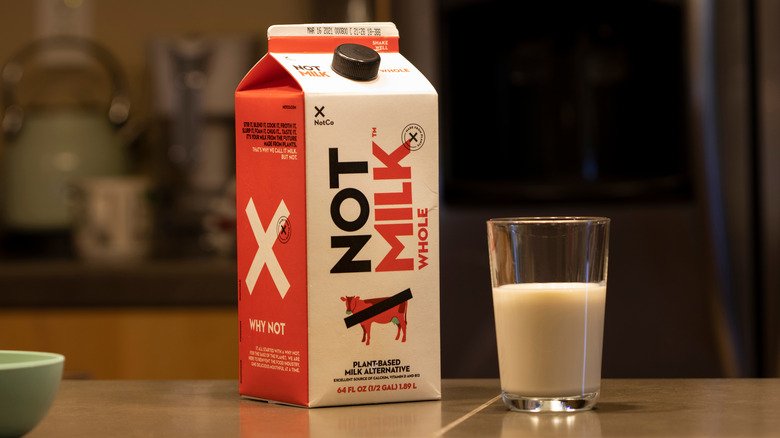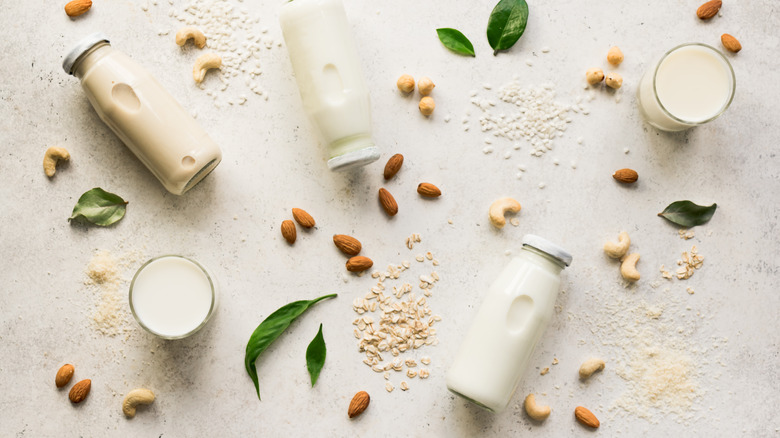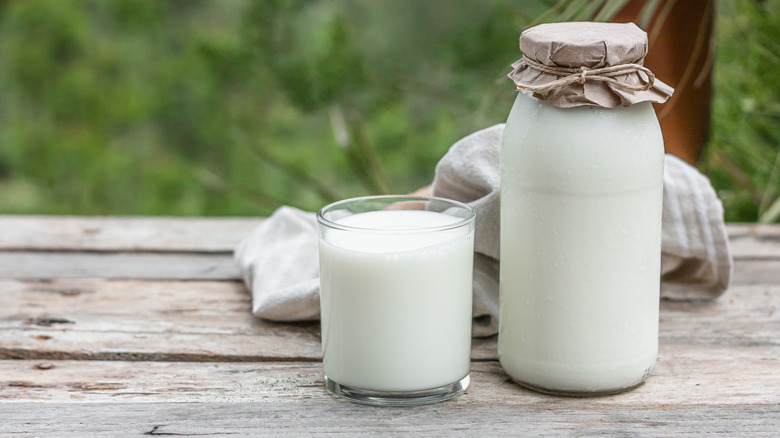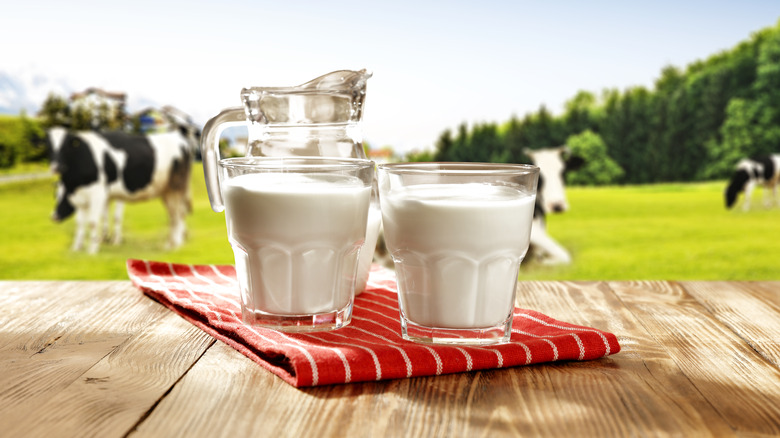Is NotMilk More Nutritious Than Dairy Milk?
From household names like oat, almond, and soy milk, to more unusual options like barley, pili nut, and macadamia milk, there's no shortage of dairy-free milk alternatives available to anyone looking to curb their dairy consumption or stick to a more plant-based diet.
However, one new entry into the unconventional milk space is hoping to take over the dairy-free market and claims to be the ultimate replacement for cow's milk in terms of taste, texture, and nutrition. Enter NotMilk, a new plant-based product with the goal of being the most reminiscent alternative to cow milk not only in flavor and feel but also molecular makeup.
NotMilk is the creation of NotCo, a Chilean start-up with the mission of taking "animals out of food production while never, ever compromising on taste." The company wants to "reinvent the food we love to eat, using plants to replicate animal-based products and make them taste even better."
What is NotMilk made from?
While most milk alternatives are rooted in one base ingredient, like oats, rice, or almonds, NotMilk is more varied in its makeup, consisting of more than a dozen ingredients, including pineapple juice concentrate, pea protein, chicory root fiber, coconut oil, and cabbage juice concentrate. If this odd combination sounds like something no human could have put together, it's because NotMilk's unique blend was not developed by a person, but by an algorithm.
According to NotCo, this sophisticated algorithm, which the company named "Giuseppe," was tasked with learning "infinite combinations of plants to replicate animal products, make them sustainable, and taste even better." Using this AI, NotCo was able to make an animal-free product that is as close as you can get to cow milk without the udders.
According to the Washington Post, Giuseppe — named after Giuseppe Arcimboldo, a 16th century painter who melded humans with plants in his portraits (via Britannica) — was developed and fine-tuned for a year and a half starting in 2019, with the goal of finding plants that could most accurately replicate cow's milk on a molecular level.
The final result was NotMilk, a product that NotCo is hoping will be a viable environmentally friendly and animal-free milk replacement for meat eaters, vegans, and everyone in between.
How does the flavor of NotMilk stand up to cow milk?
According to a Today Show writer who sampled NotCo's whole milk and 2% reduced fat varieties, the flavor of NotMilk was "the closest that any non-dairy milk has come to tasting like the stuff from cows," with a creamy texture reminiscent of real dairy. When tested over cereal, "both were great," and "both varieties of NotMilk foamed nicely with an electric frother."
Larisha Bernard, author of the vegan website Make It Dairy Free, also sampled NotMilk's products and told the Washington Post that "it's the closest thing that we remember milk tasting like," noting that she utilizes the vegan alternative as a dairy replacement in creamy sauces, mac and cheese, and beyond.
Some Washington Post taste testers did note that the "difference was perceptible" when tasted side-by-side with cow's milk, as it is "slightly beiger in hue and sweeter on both the nose and the mouth, with faint notes of coconut and pineapple." However, they also settled on the opinion that "on its own, NotMilk tasted good — and far more like dairy than other plant milks."
Is the nutritional value of NotMilk up to snuff?
In a head-to-head nutritional evaluation by the Today Show, comparing calories, fat, sugar content, vitamins, and other nutrients, it was found that while NotMilk stands up relatively well to cow's milk, there are a few nutritional shortcomings to take into account.
While an 8-ounce glass of NotMilk contained 109 fewer calories and 9 fewer grams of sugar than an 8-ounce portion of cow's milk, the total amount of fat, saturated fat, and calcium remained consistent in both. However, when it came to protein and potassium, NotMilk fell short, containing half the protein of cow's milk (4 grams vs. 8 grams) and far less potassium at 7.4 milligrams of potassium per glass of NotMilk compared to 374 milligrams of potassium in the cow's milk.
While NotMilk failed to match the potassium and protein levels of cow's milk, on the whole, the side-by-side comparison still shows a promising nutritional makeup for the vegan alternative. Earlier this year, a study in the Journal of Food Science and Technology found that soy milk was the healthiest non-dairy milk alternative when pitted against almond, coconut, and rice milk. However, the taste and texture of soy milk is arguably a far departure from cow's milk.
In comparison, NotMilk could be the first non-dairy alternative to truly live up to cow's milk in terms of taste and texture — all while paving a path forward for plant-based products aiming to better the environment one bowl of cereal at a time.



